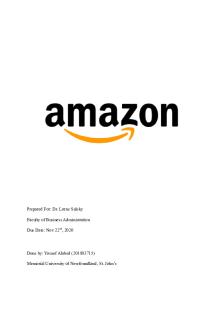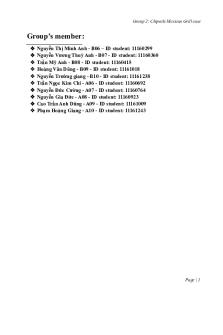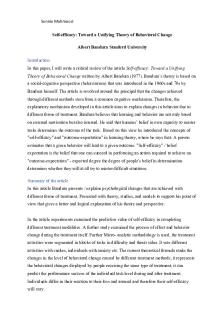Ins Individual Assignment PDF

| Title | Ins Individual Assignment |
|---|---|
| Author | Luqman Hakim |
| Course | Business in finance |
| Institution | Universiti Teknologi MARA |
| Pages | 7 |
| File Size | 196.8 KB |
| File Type | |
| Total Downloads | 38 |
| Total Views | 133 |
Summary
BACHELOR OF BUSINESS ADMINISTRATION (HONS) FINANCE2021INTRODUCTION TO TAKAFUL (INS510)INDIVIDUAL ASSIGNMENT (20%)PREPARED BY:NAME CLASS STUDENT IDIMAN FIRDAUS BIN MOHD KHAIROL ANUAR JBA2424A 2019218296PREPARED FOR:MADAM NURUL AIEN BINTI ABD AZIZ1. Introduction and Background of Study 1 Concept of Ta...
Description
BACHELOR OF BUSINESS ADMINISTRATION (HONS) FINANCE 2021 INTRODUCTION TO TAKAFUL (INS510) INDIVIDUAL ASSIGNMENT (20%)
PREPARED BY: NAME IMAN FIRDAUS BIN MOHD KHAIROL ANUAR
CLASS JBA2424A
PREPARED FOR: MADAM NURUL AIEN BINTI ABD AZIZ
STUDENT ID 2019218296
1. Introduction and Background of Study 1.1 Concept of Takaful The essence and idea of Takaful revolve around mutual assistance, protection, indemnity, solidarity and sharing liabilities among the participants. Facing risks or dangers as a group and working collectively makes the burden of loss much lighter and affordable. If any of the members are afflicted with harm, the entire group feels responsible for assisting the afflicted member. It is significant since it creates harmony and brotherhood among the participants. As mentioned above, similar features were perceived under the Arab’s tribal customs and practices in the form of ‘Aqilah’ regarding the fulfilment of blood money, which was approved and adopted by Prophet Muhammad (PBUH).Basically, in the Takaful scheme, groups of people facing the same peril and harm will be willing to make contributions in the form of a certain sum of money to a common fund, which can be used for the compensation to those members who suffer from a defined loss. For instance, in the case of modern motor policy, a vehicle driver faces many risks daily while driving. These motor-cycle drivers may form a group and make contributions to a particular sum of money to compensate any participant that may suffer an accident. A similar concept of insurance can also be applied to marine and fire. Islamic teachings highly emphasize such fervent arrangements of indemnity and solidarity emphasized by Islamic teachings while similar injunctions are also found in many Holy Qur’anic verses and the sayings of the Prophet Muhammad (PBUH).Profit maximization is not the primary objective of the Takaful scheme. If any of the customers decide to exit from the fund, they receive a full refund of the premium they have paid after deducting the operations costs. Takaful promotes sharing responsibilities to protect policyholders against misfortunes and risks according to the policy.
1.2 Comparison between Takaful and Conventional Insurance All insurance plans have the same goal where to relieve the participants' financial burden in the event of a peril, danger, or catastrophe. Nonetheless, there are some distinctions between takaful and traditional insurance. The takaful scheme is based on mutual cooperation, solidarity, and indemnity, with participants guaranteeing each other against potential damages or disasters. Participants agree to split the financial burden and help one another in overcoming the specified incident. The takaful operator manages and invests the money donated to the fund, which is then used to pay the participants. The threats and hazards are passed from the insured party to the insurer business in conventional insurance. The conventional insurance policy contains forbidden components, which goes against Islamic law's fundamental principles. The takaful company does not function as an insurer; rather, it manages and invests the funds that have been donated. The risk coverage is not sold by the operator, and it is not purchased by the participants. Furthermore, unlike conventional insurance, the takaful operator's risk (of having to pay participants for claims) is not exchanged for the sum donated to the fund; rather, the risk is spread among the members. Nonetheless, a traditional insurance firm operates as an insurer, and the framework is built on "danger assumption," meaning it can pay less (or more) than the insured property's actual value. The funds for a Takaful scheme come from policyholders, and the takaful operator manages the business operations using mudarabah, wakalah, or waqf models. Meanwhile, in conventional insurance, funds are raised by shareholders, and business operations are exclusively handled by the insurer (the company), with no involvement from policyholders. The funds raised in the Takaful scheme are invested in Shari'ah-compliant companies. Takaful raises society's moral values and provides appropriate solutions to the dilemmas that arise as a result of the specific risks. When a conventional insurance firm sells a policy to a customer, the company decides to assume responsibility for the loss and pay the client. The type of protection in the policy's inclusions and exclusions are calculated. The insurer compensates the client whenever an insured event occurs. However, if the specified event does not occur during the duration, the company retains all of the paid premiums and the insured earns nothing.
2. Two issues in Takaful 2.1 Lack of consumer awareness Despite the introduction of Takaful, the increase in the level of penetration anticipated has yet to be realised. Many consumers are still unaware of Takaful as an alternative, and some view Takaful as commercialisation of conventional insurance into the Islamic world and reject the notion that it is a Shariah-compliant instrument. Consumers' lack of awareness and comprehension of the fundamentals and technicality of the goods and services, they are concerned with can result in a clear lack of customer-motivated reasons to own insurance goods and services. According to a study conducted by Hamid et al (2001) on Malaysian consumers' awareness and understanding of Islamic banks, the majority of Malaysian clients were unaware of the differences between Islamic and conventional bank products, although the plurality were aware of the presence of Islamic banks in Malaysia and their products. Despite the fact that half of the respondents worked with Islamic banks, they had little knowledge of the Islamic financial products. 2.2 Issues surrounding the type of risk deemed acceptable in Takaful Another topic of debate amongst scholars is the type of risks that are deemed to be acceptable within Takaful, and this issue mainly related to General Takaful. As the concept of Takaful is to mutually guarantee all participants, there is argument that for large risks where the number of participants is limited, those risks may not fall within the concept of Takaful. For example, Takaful coverage for government-owned projects where all the participants within the pool are government agencies may not essentially achieve the concept of mutual (as arguably there is only one participant in the pool, the government). There is a debate on whether there should be a distinction between Halal (lawful) and Haram (unlawful) risk, and if prior screening of risks is necessary for acceptance within the Takaful pool. Related to the lack of standardisation in types of acceptable risks is the lack of uniformity in the definitions of insured events and exclusions. For instance, in Family Takaful treatment of suicide, AIDS, and contestability is non-uniform. This complicates the applicability of pricing assumptions based on experience statistics drawn from the conventional business and complicates pooling of experience statistics drawn from conventional business and complicates pooling of experience among Takaful operations with differing underwriting and contract definitions.
3. The causes and effects of the issues 3.1 Lack of consumer awareness Many people underestimate the value of security and retirement planning, and many people rely mainly on public security programs, which is especially true in the Middle East. Takaful coverage, like conventional insurance, is usually a product that needs to be marketed to customers (instead of one that is bought by consumers). According to Ahmad et al. (2010), limited experience and competent human resource are the weakness of current Takaful operators and it becomes more problematic due to the absence of a framework for corporate governance, Shari’ah compliance, legal and regulatory, taxation and international accounting standards which complement the Takaful industry leads to lack of consumer awareness. Other than that, the misconception occurs mostly due to the name ‘Takaful’ and the origin of this protection system which is related to Islam. Many non-Muslims wrongly connect the dots and misunderstand that Takaful is religion-based and hence, is not for non-Muslims.
3.2 Issues surrounding the type of risk deemed acceptable in Takaful 4. Solutions or any limitations to the issues discussed 4.1 Lack of consumer awareness To build market awareness, Various campaigns and programmes like a collaboration with other organization have been initiated with the aim to increase public awareness on takaful. For example, under community engagement, Malaysian Takaful Association and Etiqa Takaful Berhad have jointly organized the Jalinan Takaful Iftar Ramadhan event on 12 June 2017 with the aim of engaging the targeted communities to create takaful awareness within their locality. Further, The education program should work quite effectively with a strong disclosure mechanism that have such a proper tools (effective IT system, effective social communications, listening to participants expectations, and educated sales personnel and intermediaries) to disseminate the required information to participants. For instance, Universiti Teknologi Mara (UiTM) introduce and provided course related to takaful, Introduction to Takaful (INS510) to introduce the concept and application of Islamic Insurance and expose the importance of takaful compared to conventional insurance to the students. Other than that, as number of smartphone users increases over time, promoting takaful market and creating takaful awareness via smartphone advertising, or also known as mobile
advertising, may help. Next, in order to reduce the gap in talent shortage, the industry players must play greater role in designing and strategizing human capital. One way to increase the number of talents is by offering competitive remuneration. Another possible effort that should be taken to minimize the shortage of talent is to ensure graduates from the certified programs such as the Chartered Professional in Islamic Finance, Certified Shari’ah Advisor and Certified Shari’ah Practitioner is ready and able to join the takaful workforce. Lastly, through the researcher’s findings, Muslim consumer has an excellent perception towards Takaful. Thus, Takaful companies should held motivational talk on what they can offer to steadily increase and maintain consumer’s perception about Takaful.
4.2 Issues surrounding the type of risk deemed acceptable in Takaful
5. CONCLUSION
In conclusion, Takaful is the means of bringing the social and economic benefits of modern insurance coverage, in a form consistent with their religious beliefs, to Muslims and to the emerging economies of many predominantly Muslim countries. Takaful is essential if insurance provision is to support the development of Muslim economies of Asia, Africa & the Middle East and lift millions of people out of poverty. As an untapped market with massive growth potential it also offers substantial rewards for insurance providers. The takaful sector promises to continue its rapid expansion. However, the sector should not ignore the dangers this growth presents. It is therefore vital that legal and regulatory mechanisms are improved in support of corporate governance, policyholder rights, and the management of investment risks. Funds must also expand their size and capital base, develop their human resources and expand distribution networks if they are to facilitate continued sustainable growth.
REFERENCES 1- GIG Bahrain Takaful, The concept of Takaful, Retrieved from https://gigtakaful.bh/takafulconcept/ 2- Ilhamiddin Ikramovich Nazarov and Naeem Suleman Dhiraj, (4/30/2019) , A Conceptual Understanding and Significance of Takaful (Islamic Insurance): History, Concept, Models and Products, Vol 7 No 4 2019, 280-298 , https://doi.org/10.31686/ijier.Vol7.Iss4.1408 3- Safder Jaffer Farzana Ismail Jabran Noor Linsay Unwin , (November 2010) , Takaful (Islamic Insurance) : Concept, Challenges and Opportunities. 4-...
Similar Free PDFs

Ins Individual Assignment
- 7 Pages

INS darshan - Ins pdf
- 106 Pages

Individual Assignment
- 26 Pages

Individual Assignment
- 20 Pages

Individual assignment
- 5 Pages

Individual assignment
- 3 Pages

MGT 162 INDIVIDUAL ASSIGNMENT
- 24 Pages

finance - individual assignment
- 7 Pages

Mkt individual assignment
- 4 Pages

BUS assignment individual
- 7 Pages

Report - Assignment 2 : Individual
- 11 Pages

Individual Assignment 1
- 1 Pages
Popular Institutions
- Tinajero National High School - Annex
- Politeknik Caltex Riau
- Yokohama City University
- SGT University
- University of Al-Qadisiyah
- Divine Word College of Vigan
- Techniek College Rotterdam
- Universidade de Santiago
- Universiti Teknologi MARA Cawangan Johor Kampus Pasir Gudang
- Poltekkes Kemenkes Yogyakarta
- Baguio City National High School
- Colegio san marcos
- preparatoria uno
- Centro de Bachillerato Tecnológico Industrial y de Servicios No. 107
- Dalian Maritime University
- Quang Trung Secondary School
- Colegio Tecnológico en Informática
- Corporación Regional de Educación Superior
- Grupo CEDVA
- Dar Al Uloom University
- Centro de Estudios Preuniversitarios de la Universidad Nacional de Ingeniería
- 上智大学
- Aakash International School, Nuna Majara
- San Felipe Neri Catholic School
- Kang Chiao International School - New Taipei City
- Misamis Occidental National High School
- Institución Educativa Escuela Normal Juan Ladrilleros
- Kolehiyo ng Pantukan
- Batanes State College
- Instituto Continental
- Sekolah Menengah Kejuruan Kesehatan Kaltara (Tarakan)
- Colegio de La Inmaculada Concepcion - Cebu



